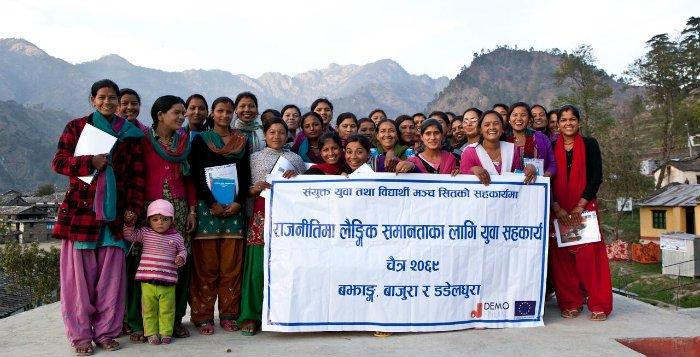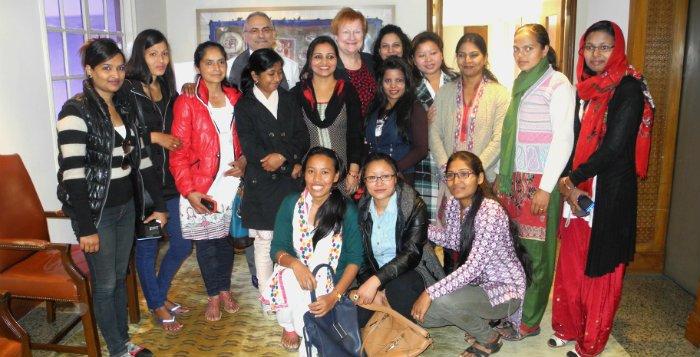“Earlier we used to see a lot of controversy and there was a culture of revenge between women with different political ideologies. But now we see a lot of synergy and we are ready to stand together and fight for a common cause”, said a participant of the “Mobilizing Youth for Gender Equality” project, Mina Sharma from the Young Communist League.
The project by Demo Finland and a local women’s organization Asmita started in 2013 and 612 young women politicians participated in the trainings in more than ten districts of Nepal. Overall, more than 1500 members of political parties benefitted from the project activities over the three years.
The evaluation of the project describes “Mobilizing Youth for Gender Equality” as the first of its kind in Nepal and the EU chose the project as one of ten EIDHR-projects that were showcased in its “Study on Political Party Support”.
In addition to enhancing co-operation across party-borders, the project aimed at providing the participants with useful hands-on skills and knowledge – starting from self-confidence and public speaking – needed in democratic politics
“Before these trainings, some of our colleagues used to be afraid of speaking in front of people. During the trainings, they did practice presenting their issues and ideas to other participants and got the opportunity to leave shyness, nervousness and hesitation behind”, explained Gyanu Timilsina, representing Nepal Students’ Union.
One of the core issues identified in the trainings was the lack of information, and the culture of keeping information away from youth, that these young women are accustomed to. This is the norm especially in the case of young women since politics is traditionally considered something that the men take care of.
“During the trainings we understood how even our own parties are not giving sufficient information to us. How could young women politicians build their career in their parties and politics, if we are not aware of our rights and do not know about current issues and happenings?” explained Rekha Gupta from Sadhbhawana party.
Increased awareness on women’s rights and the systematic nature of gender-based discrimination are mentioned as key results of the project in the evaluation report. The evaluators see the lack of gender equality as one of the biggest obstacles to democracy in Nepal.
The marginal role of women was evident also during the trainings when many of the participants got their first experience of a female trainer; several even mentioned that they did not know that women could be a trainer. The trainers of Demo Finland partner Asmita are praised by the evaluators and during the project several participants proceeded to more important positions in their parties or organizations.
The coordination of the project activities was done by a steering group that had members from each participating organization. The steering group members got to attend several high-level seminars and got a chance to meet veteran politicians, such as former President of Finland, Tarja Halonen and former Finnish Minister for International Development, Heidi Hautala. Laxmi Khatiwada, representing Nepal Tarun Dal, was surprised to hear how women politicians face similar problems all around the world. She also said that it is very useful to hear about these experiences and learn from success stories of successful women politicians.
The implementation of project activities was hampered by the narrowing space of civil society and ever-changing requirements from the Nepalese authorities, especially towards organizations working with political actors. In 2014, the activities were on hold for half a year because of the slow processing of Demo Finland’s registration renewal in Nepal. In the spring of 2015, several major earthquakes hit Nepal and some of the last activities could not be carried out.
The restrictions and requirements by the Nepalese authorities together with the foreseen cuts on international development funds by the Finnish government, led to a decision to not seek continuation to the project and closing down of Demo Finland office in Nepal in August 2015.
The project was supported by the EU and co-financed by the Ministry for Foreign Affairs of Finland.


